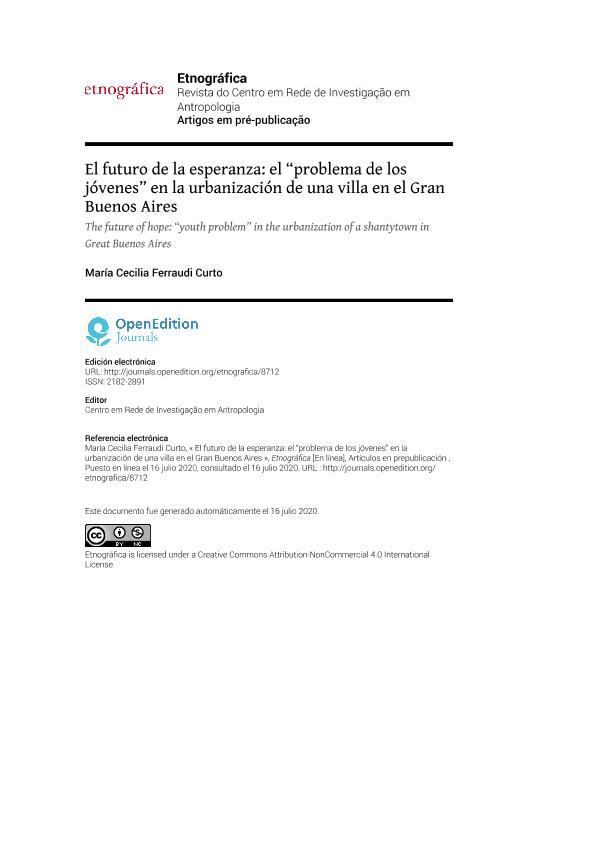Mostrar el registro sencillo del ítem
dc.contributor.author
Ferraudi Curto, Maria Cecilia

dc.date.available
2022-09-22T17:50:30Z
dc.date.issued
2020-08
dc.identifier.citation
Ferraudi Curto, Maria Cecilia; El futuro de la esperanza: el "problema de los jóvenes" en la urbanización de una villa en el Gran Buenos Aires; Centro em Rede de Investigaçao em Antropologia; Etnográfica; 25; 1; 8-2020; 73-93
dc.identifier.issn
0873-6561
dc.identifier.uri
http://hdl.handle.net/11336/170043
dc.description.abstract
En este artículo, me propongo reflexionar sobre “el problema de los jóvenes” tal como se presentó durante mi etnografía. A partir de una pregunta por la política, me interesé por la urbanización de una villa de La Matanza considerada emblema de las políticas urbanísticas durante el kirchnerismo. El “problema de los jóvenes” cobró importancia para mí porque les importaba a mis interlocutores en el barrio. En este artículo, intento mostrar cómo se entrelazan diferentes relaciones entre la población y el Estado en la elaboración de dicho problema. Se trata de una manera de responder tanto a las miradas que se centran sólo en el Estado carcelario como a aquellas que enfocan exclusivamente hacia las políticas redistribucionistas de un Estado populista, para indagar cómo diferentes políticas estatales son apropiadas por diferentes actores locales, respondiendo a (y reforzando) las heterogeneidades sociales en un contexto de inestabilidad persistente.
dc.description.abstract
In this article, I intend to reflect on “the problem of youth” as it was presented during my ethnography. From a question about politics, I got interested in the urbanization of a shantytown in La Matanza considered an emblem of urban policies during the Kirchner governments. The “problem of youth” became important to me because it mattered to my interlocutors in the neighborhood. In this article, I try to show how different relationships between the population and the State are intertwined in the elaboration of this problem. It is a way of responding to both the views that focus only on the prison State and those that focus exclusively on the redistribution policies of a populist State, to investi-gate how different State policies are appropriated by different local actors, responding to (and reinforcing) social heterogeneities in a context of persistent instability.
dc.format
application/pdf
dc.language.iso
spa
dc.publisher
Centro em Rede de Investigaçao em Antropologia
dc.rights
info:eu-repo/semantics/openAccess
dc.rights.uri
https://creativecommons.org/licenses/by-nc/2.5/ar/
dc.subject
ARGENTINA
dc.subject
HETEROGENEITIES
dc.subject
SHANTYTOWN
dc.subject
STATE
dc.subject
YOUTH
dc.subject.classification
Antropología, Etnología

dc.subject.classification
Sociología

dc.subject.classification
CIENCIAS SOCIALES

dc.title
El futuro de la esperanza: el "problema de los jóvenes" en la urbanización de una villa en el Gran Buenos Aires
dc.title
The future of hope: “youth problem” in the urbanization of a shantytown in Great Buenos Aires
dc.type
info:eu-repo/semantics/article
dc.type
info:ar-repo/semantics/artículo
dc.type
info:eu-repo/semantics/publishedVersion
dc.date.updated
2022-09-22T15:06:12Z
dc.identifier.eissn
2182-2891
dc.journal.volume
25
dc.journal.number
1
dc.journal.pagination
73-93
dc.journal.pais
Portugal

dc.journal.ciudad
Lisboa
dc.description.fil
Fil: Ferraudi Curto, Maria Cecilia. Universidad Nacional de San Martín. Instituto de Altos Estudios Sociales; Argentina. Consejo Nacional de Investigaciones Científicas y Técnicas; Argentina
dc.journal.title
Etnográfica

dc.relation.alternativeid
info:eu-repo/semantics/altIdentifier/url/https://journals.openedition.org/etnografica/8712
dc.relation.alternativeid
info:eu-repo/semantics/altIdentifier/doi/https://doi.org/10.4000/etnografica.8712
Archivos asociados
